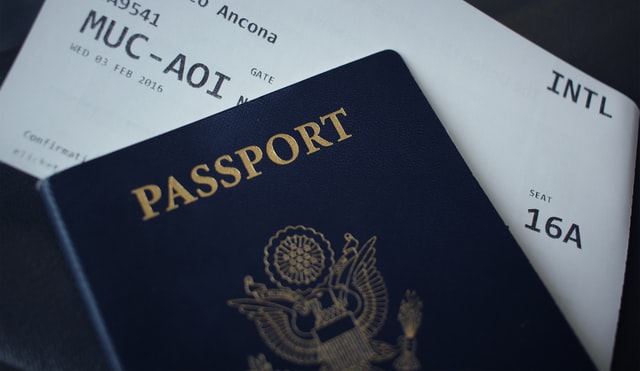If you are looking for a country with beautiful landscapes and coastlines, a safe environment, excellent educational system, among others, then Ireland is the place.
Even if Ireland is a small country, it is well-developed and has been rated among the top countries to live in the world.
Are you thinking of moving to Ireland? If yes, then this article is for you.
Here, I will show you the Irish visa requirements and other processes involved in getting a visa.
Let me know in the comment if you have any questions. I would love to hear from you.
Table of contents
Ireland Visa

If you plan on traveling to Ireland as a Nigerian to live, study, work, or just for tourism, you need an Irish visa.
The Irish visa is what permits you to travel to Ireland legally.
There are various types of Irish visas, and the type of visa you apply for depends on what you want to do in Ireland and how long you wish to stay there.
Types of Irish Visas

There are two categories of Irish visas: Type C and Type D.
The Type C visas are for short stays, while the Type D visas are for long-stay visas.
Some of these Irish visas include:
- Irish Student Visa
- Irish Work Visa
- Irish Tourist Visa
- Irish Visitor Visa
- Irish Family Reunification Visa
Irish Student Visa
This visa permits you to study in Ireland for an Interim List of Eligible Programmes (ILEP) course.
You must also have gotten admission into an Irish university and have paid your fees before applying.
The student visa can be a Type C visa or a Type D visa, depending on the duration of your course.
Irish Work Visa
This visa permits you to work in Ireland. However, there are several types of work visas depending on the kind of work you want to do and how long you wish to stay in Ireland.
Note that if you would be coming to Ireland to work for more than three months, you must have a contract of employment and apply for work permits.
Irish Tourist Visa
Interested in seeing the fantastic coastlines and beautiful countryside in Ireland?
If yes, then you can apply for a tourist visa.
However, with this visa, you cannot take up paid or unpaid work during your time in Ireland.
Irish Visitor Visa
If you have a family member or friend in Ireland, you can apply for a visitor visa to see them.
This visa is a short-stay visa; you can only stay in Ireland for ninety (90) days or less.
Note that you are not allowed to work in Ireland with a visitor visa.
Irish Family Reunification Visa
If you want to join your family in Ireland, this visa is for you.
Family reunification is a long-stay visa.
Hence, you can stay in Ireland for more than ninety (90) days as long as you meet the requirements.
Ireland Visa Requirements

Every Irish visa type has specific requirements that applicants must meet before being considered for the visa.
The general requirements for an Irish visa include the following:
- International Passport
- Passport Photographs
- Visa Application Form
- Application Letter
- Proof of Accommodation
- Employment or Academic Documents
- Language Proficiency Test Results
- Proof of Financial Ability
- Medical Insurance
- Travel Itinerary
- Proof of Paid Visa Fees
International Passport
You must provide your international passport and previous passports and visas, if applicable.
This passport must have at least two blank pages and be valid for at least a year after the day you arrive in Ireland.
Note that you must provide a copy of the data page of your passport.
Passport Photographs
You must present two passport photographs in line with the Ireland photo requirements.
Therefore, the photos must be coloured, not older than six months, and measure 45mm-50mm by 35mm-38mm.
Your face must be in the centre and have a neutral expression.
The photos must be taken on a white or grey background.
Remember that your visa application may be delayed or even rejected if your passport photos do not comply with the standards.
Visa Application Form
You must start your application and fill out the form online through AVATS.
Follow the instructions, print, date, and sign it.
You are to fill this form honestly without any errors. Otherwise, it may cause problems for you in the long run.
Application Letter
You must submit a letter that describes why you want to travel to Ireland. This letter must be detailed and well-written.
Do not try to hide anything from the authorities.
For instance, if you are going for business purposes, you should give details.
Proof of Accommodation
You must provide proof of where you will be staying in Ireland.
You can book a hotel reservation and present it.
If a family member or friend has invited you, you must get a signed invitation letter from them.
Employment or Academic Documents
If you are employed, you must provide a letter from your employer stating your employment details and showing that you will return to work after your trip.
If you are a student, you must present your academic certificates, such as WAEC and NECO results.
Language Proficiency Test Results
You must show that you understand either English or Irish.
You can prove your mastery of English by taking an IELTS or TOEFL exam and presenting your test results.
Proof of Financial Ability
You must show sufficient funds to support yourself throughout your stay in Ireland.
You can prove this by presenting bank statements from the last six (6) months or that of your sponsor if you have any.
Note that your sponsor must also write a letter proving they would sponsor you and show their relationship to you.
Medical Insurance
You must prove that you possess medical insurance.
If your school covers your medical insurance as a student, it would be stated in your acceptance letter.
You can also get private medical insurance that covers at least €25,000 for your health costs.
Travel Itinerary
You are required to provide your travel itinerary and show that you will be returning to Nigeria after the expiration of your visa.
You don’t need to buy travel tickets to prove this, as your visa may be denied, and you would have to bear the loss.
Proof of Paid Visa Fees
You must show evidence that you have paid the required visa fees.
Ireland Visa Application Guide

A description of Ireland visa application processes
- Start your Application Online
You can begin your application online and fill out the form there.
Please print it out, sign it, and date it once you complete the form.
You can also make photocopies in case they are needed.
Remember that providing false information could result in your visa being denied, and ultimately, a five-year ban may be placed on applying for an Irish passport. - Pay the Required Fees
If you haven’t already done so, you can pay the visa fees at the visa application centre, where you submit your application: an Irish visa costs €60 for a single entry and €100 for multiple entries.
The VFS office may also ask you to pay additional fees if necessary. - Visit the Visa Application Center
You must have made an appointment with VFS before visiting their office.
You must present all of your documents at the office, including your passport.
These documents should be double-checked to ensure they are original and nothing is missing.
Your biometric data will also be collected and forwarded to the embassy because it is crucial to the application procedure.
Select the VFS location that is most convenient for you to visit. - Track your Application
You can check the status of your application online after submitting the relevant documents.
You can do this by entering your last name and the reference number found on the receipt you received from the visa application centre. - Collect your Passport
Your passport and other documents will be returned to you through courier when a decision has been made on your application.
Note that you will bear the cost of the courier service.
Also note that not all of your documents will be returned, so it is advisable to make photocopies before you submit them.
However, you can include a list with your application if there are any documents you would like to have returned.
Ireland Visa Processing Time
There is no specific time for the Irish visa to be processed.
However, due to several factors, it may take up to 6-8 weeks or even more from the date of your application.
Ireland Visa Refusal
If your Irish visa has been refused, it may be because of any of the following reasons:
- Incorrect information
- False documents
- Invalid passport
- Insufficient funds
- Missing documents
Conclusion
Ireland is a great place to live, especially if you love beautiful environments and sound security systems.
However, if you want to travel to Ireland for any reason, you need an Irish visa.
This post has shown you all the requirements for getting an Irish visa and the processes involved.
Following the guidelines in this article would help you get an Irish visa without hassles.
Let me know in the comment box below if you have any questions or need further clarification. I will love to help you.

Good morning, I’m Mathew Joseph Onuh from Nigeria, I’m interested to come and study Business courses in Ireland,and I need a guide line on ho to go about it please help me out. Thanks my kind regards.
Sure, here are some guidelines on how to study business courses in Ireland:
1. Choose a university or college: There are many universities and colleges in Ireland that offer business courses. You can choose a university or college based on your academic interests, the location of the university or college, and the cost of tuition.
2. Check the admission requirements: Each university or college has its own admission requirements. You will need to meet the academic requirements, such as your GPA and your IELTS score. You may also need to provide letters of recommendation and a personal statement.
3. Apply for admission: Once you have chosen a university or college, you can start the application process. The application process is usually online and you will need to submit your academic transcripts, your IELTS score, your letters of recommendation, and your personal statement.
4. Get a student visa: If you are not an EU citizen, you will need to get a student visa to study in Ireland. You can apply for a student visa at the Irish embassy or consulate in your home country.
5. Arrange your accommodation: You will need to arrange your accommodation before you come to Ireland. You can find accommodation in student halls of residence, private apartments, or with a host family.
6. Get travel insurance: You will need to get travel insurance before you come to Ireland. Travel insurance will cover you in case of medical emergencies or other unforeseen circumstances.
7. Arrive in Ireland and start your studies: Once you have arrived in Ireland, you can start your studies. You will need to register with the university or college and you will need to attend classes.